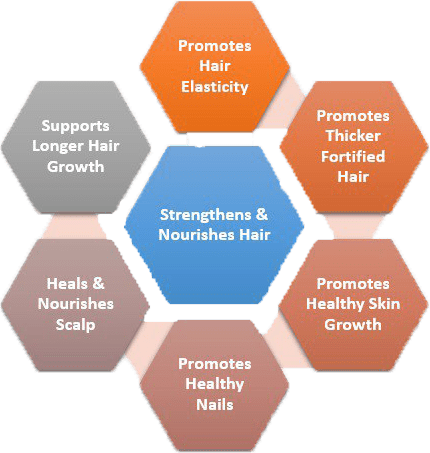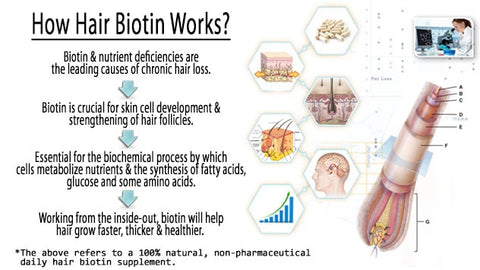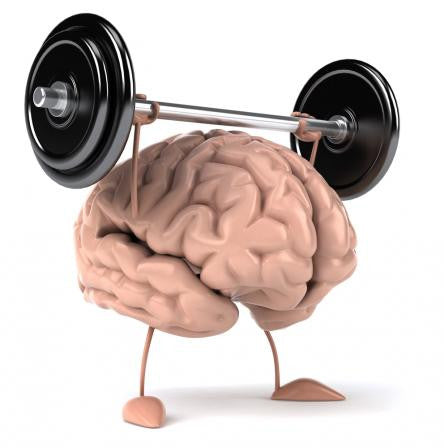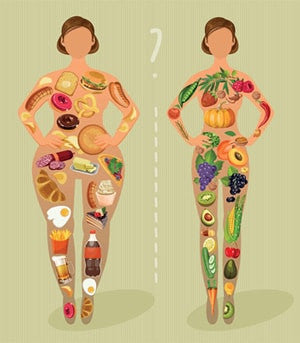
5 Must Know Benefits Of Biotin
When you see biotin on the supplement shelf of your local grocery store, you may be thinking about how it's healthy for your skin, nails, and hair. While it is true that biotin has incredible benefits for helping keep you looking your best by keeping your nails shiny, your skin supple and your hair lush, that's not all that biotin accomplishes. What many people don't know are biotin's surprising benefits when it comes to their overall health and each benefit it has for the rest of their body. Biotin doesn't just stop at appearance but also helps keep your body in working order, all the way from the cardiovascular system to the central nervous system.
What Makes Biotin So Beneficial?
Biotin is comprised of vitamin B7. This vitamin is a water-soluble vitamin. Biotin, or B7, is a vital part of your nutritional balance and helps keep your body functioning the way it's  supposed to, keeping your metabolic system healthy along with your nerve, cardiovascular, and digestive systems. It is an essential part of helping your body digest food and nutrients, turning it into the fuel, or energy that you can use to go about your day-to-day activities.
supposed to, keeping your metabolic system healthy along with your nerve, cardiovascular, and digestive systems. It is an essential part of helping your body digest food and nutrients, turning it into the fuel, or energy that you can use to go about your day-to-day activities.
What is the Risk of Biotin Deficiency?
Biotin or Vitamin B7 deficiency presents a multitude of problems if not kept in check. Not only does biotin help regulate your cardiovascular, nervous, and metabolic system, but it also keeps other health concerns in check such as diabetes and chronic fatigue.
Neurodegenerative diseases such as Alzheimer's disease and dementia are a particular area of interest when it comes to Biotin's potential benefits in treating and preventing symptoms.
So, what are really the risks of Biotin deficiency? Surely this nutrient can't be that important to our everyday health, after all, it would be far more popular, right?
Well, not so much. Poor levels of Vitamin B7 can lead to symptoms such as low energy, fatigue, weight gain and other various digestive problems and metabolic diseases. B7 deficiency has even been linked to the development of diabetes, appetite troubles, and mood swings.

If these symptoms sound familiar, chances are that you are experiencing a deficiency. Many Americans every single day live their lives like this and never look further into the cause, covering up their lack of energy and chronic fatigue with more coffee and much-needed daytime naps.
What Food Contains Biotin?
If you're experiencing a Biotin deficiency, you may be interested in eating more of the foods that naturally contain Biotin, or Vitamin B7, instead of taking dietary supplements. Well, the good news is that a lot of foods you eat every day already contain Vitamin B7.
Calf's Liver – Calf's liver is a wonderful source of B7, sporting around 30 mg per 3 ounces.
Chicken Eggs – 1 whole egg holds a whopping 25 mg of B7
Atlantic Salmon – Fresh salmon contains between 4-6 mg of B7 per 3 ounces.
Avocado – 1 whole avocado contains around 4-6 mg of B7
Raspberries – 1 cup of deliciously tart raspberries contains between 0.5 to 2 mg of B7.
Cauliflower – 1 cup of cauliflower contains between 0.5 to 2 mg of B7
1. Biotin Helps Regrow Damaged Hair
Biotin really does help make your hair look lush and healthy, but did you know that it also helps regrow damaged hair? In a double-blind placebo study, scientists took a sample group of women who had visible hair loss. These women took nutritional supplements of B7 (or Biotin) and another sample group took a placebo.

In the conclusion of this study, it was confirmed that the women who took the B7 nutritional supplement experienced a reduced rate of hair loss and actually started seeing their hair regrow. This study lasted for an initial 90 days and most women continued to take the nutritional supplement. After 180 days, the scientists checked back in and found that there was an even greater increase in hair growth, suggesting that ongoing treatment with B7 supplements can continually help regrow hair and prevent damage. No adverse effects were documented in any of the individuals participating in the study.
2. Biotin Helps Maintain Your Blood Sugar
Vitamin B7, or biotin, in combination with a mineral called chromium has been shown to help maintain blood glucose levels as well as help improve glucose intolerance. This is especially important for individuals who suffer from diabetes or other glucose issues. Vitamin B7 helps regulate and spur the activity of insulin and reduce the risk of fluctuating blood sugar. Fluctuating blood sugar is a common symptom of diabetes, metabolic syndrome, and weight gain.
3. B7 Biotin Helps Prevent Alzheimer's
Biotin, along with many other B vitamins, has been shown to help prevent symptoms of Alzheimer's disease and dementia. Many of the B vitamins have shown positive results in the health of the brain, preventing or potentially preventing many neurodegenerative diseases.
While the studies seem to be far and few between due to a potential lack of funding for the area, scientists are still moving forward with studying biotin's potential when it comes to treating neurodegenerative diseases. Many of the studies on biotin's benefits for Alzheimer's disease still show preliminary results due to many being partial or unofficial studies, but so far the evidence is looking conclusive to show a real potential in preventing and in some cases treating the symptoms of Alzheimer's and dementia among other neurodegenerative diseases.
4. Keep a Balanced and Healthy Cardiovascular System
Biotin is popularly associated with keeping a healthy cardiovascular system, and for good reason. Beyond just being healthy for you hair, nails and skin, one of Biotin's main benefits come from helping regulate your cardiovascular system, reducing bad cholesterol and also reducing the harmful effects of stress and plaque build up. Many studies used moderate dosages of Biotin, or Vitamin B7, and many found that not only did it increase your levels of good cholesterol, but it also decreases your bad cholesterol.
Along side this great news, a proper supplementation of B7 has been shown to  potentially protect your heart against many different ailments such as inflammation, stroke, heart attacks and helps prevent heart disease. Keeping a balanced cardiovascular system is important for the health and function of your body.
potentially protect your heart against many different ailments such as inflammation, stroke, heart attacks and helps prevent heart disease. Keeping a balanced cardiovascular system is important for the health and function of your body.
5. Supports Your Metabolism and Promotes Weight Loss
Vitamin B7 plays an incredibly important role in helping encourage your metabolism. Biotin helps convert the food you put into your body into fuel, or energy, that allows you to go about your day-to-day activities and expend energy. It does this by converting the glucose found in carbohydrates and sugars into a fuel that your body prefers to burn, and helps your body use amino acids from proteins to help carry out normal bodily functions such as keeping your cardiovascular system and nervous system in check.

